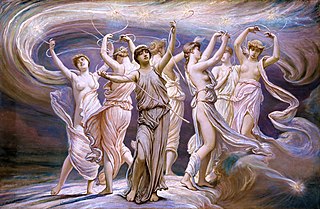
Polyphemus is the one-eyed giant son of Poseidon and Thoosa in Greek mythology, one of the Cyclopes described in Homer's Odyssey. His name means "abounding in songs and legends", "many-voiced" or "very famous". Polyphemus first appeared as a savage man-eating giant in the ninth book of the Odyssey. The satyr play of Euripides is dependent on this episode apart from one detail; Polyphemus is made a pederast in the play. Later Classical writers presented him in their poems as heterosexual and linked his name with the nymph Galatea. Often he was portrayed as unsuccessful in these, and as unaware of his disproportionate size and musical failings. In the work of even later authors, however, he is presented as both a successful lover and skilled musician. From the Renaissance on, art and literature reflect all of these interpretations of the giant.

In Greek mythology, Hilaera was a Messenian princess.
In Greek mythology, Eurypylus was the name of several different people:
Polydora was the name of several characters in Greek mythology:

Theocritus was a Greek poet from Sicily, Magna Graecia, and the creator of Ancient Greek pastoral poetry.

The Pleiades, were the seven sister-nymphs, companions of Artemis, the goddess of the hunt. Together with their sisters, the Hyades, they were called the Atlantides, Dodonides, or Nysiades, nursemaids and teachers of the infant Dionysus. The Pleiades were thought to have been translated to the night sky as a cluster of stars, the Pleiades, and were associated with rain.

Andrew Sydenham Farrar Gow was an English classical scholar and teacher. Apart from eleven years as a master at Eton College between 1914 and 1925 his career was entirely at Trinity College, Cambridge.

The Eclogues, also called the Bucolics, is the first of the three major works of the Latin poet Virgil.
Agamede was a name attributed to two separate women in classical Greek mythology and legendary history.

Andrew Dalby, is an English linguist, translator and historian who has written articles and several books on a wide range of topics including food history, language, and Classical texts.
Anaxibia is the name of six characters in Greek mythology.
In Greek mythology, the name Perimede refers to:
In Greek mythology, the name Clytie or Clytia may refer to:
The name Merops refers to several figures from Greek mythology:

Idyll XI, otherwise known as Bucolic poem 11, was written by Theocritus in dactylic hexameter. Its main character, the Cyclops Polyphemus, has appeared in other works of literature such as Homer's Odyssey, and Theocritus' Idyll VI.

In Greek mythology King Eurytus of Oechalia, Thessaly, was a skillful archer who even said to have instructed Heracles in his art of using the bow.
In Greek mythology, Philomache or Phylomache was a Minyan princess who became a queen of Iolcus.
In Greek mythology, Bias, was one of the three kings of Argos when the kingdom was divided into three domains. The other kings were his brother Melampus and Anaxagoras. From Bias, they say, a river in Messenia was called.
Idyll XIII, sometimes called Ύλας ('Hylas'), is a bucolic poem by the 3rd-century BC Greek poet Theocritus. As in Idyll XI, Nicias is again addressed, by way of introduction to the story of Hylas. This beautiful lad, a favourite companion of Heracles, took part in the Quest of the Fleece of Gold. As he went to draw water from a fountain, the water-nymphs dragged him down to their home, and Heracles, after a long and vain search, was compelled to follow the heroes of the Quest on foot to Phasis.

Idyll XXV, later titled Ηρακλής Λεοντοφόνος by Callierges, is a poem doubtfully attributed to the 3rd-century BC Greek poet Theocritus. This is an idyll of the epic sort, and is sometimes categorised as an epyllion. In the course of the narrative, Heracles visits the herds of King Augeas, and, after an encounter with a bull, describes to the king's son his battle with the lion of Nemea.









